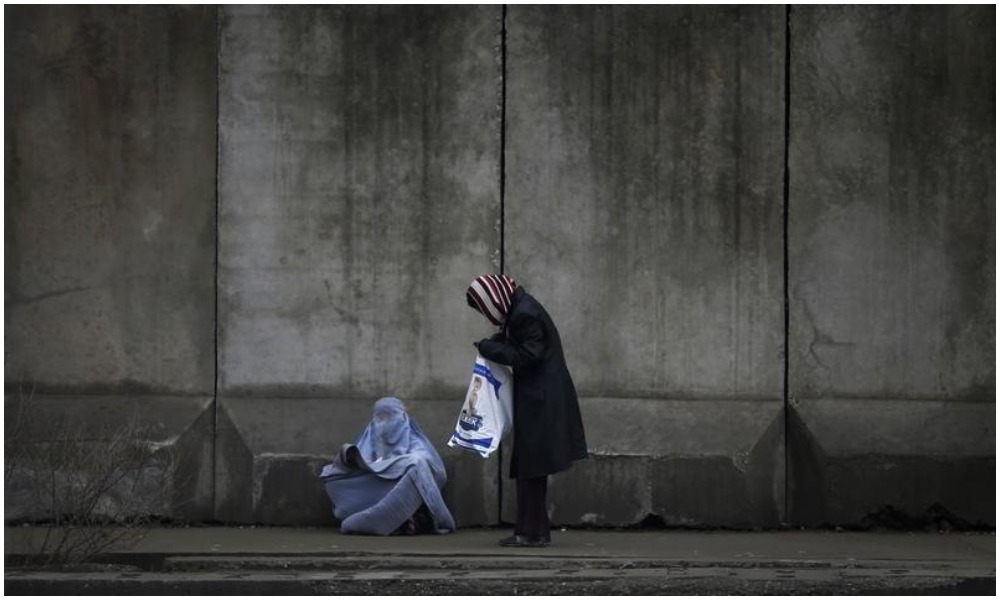Latest News
Afghanistan faces collapse of health services and mass hunger

The International Federation of Red Cross and Red Crescent Societies (IFRC) warns that Afghanistan faces imminent collapse of health services and widespread hunger if aid and money do not flow into the country within weeks.
Acute food shortages fuelled by serious drought, lack of cash and displacement, the COVID-19 pandemic and crippled health services have converged on the people of Afghanistan, with some 18 million Afghans in urgent need of humanitarian assistance.
Speaking from Kabul where he has been on a four-day official visit, Alexander Matheou, IFRC Asia Pacific Director said:
“After living through decades of fleeing and fighting, Afghans now face a severe drought which has devastated food production, leaving millions hungry and destitute.
“We are deeply concerned that Afghanistan faces imminent collapse of health services and worsening hunger if aid and money do not flow into the country within weeks. Health financing has been cut across the country placing ever more demand on Red Crescent teams.
“Urgent international action is needed to support millions of people with the necessities of life as Afghanistan’s looming harsh winter threatens greater misery and hardships.”
Afghan Red Crescent is providing support in some of the hardest hit provinces, including relief supplies to families suffering food shortages and loss of income. Red Crescent has been providing families who have lost their livelihoods due to the drought with cash grants to buy food, to plant drought-resistant food crops and protect their livestock. Health clinics, including mobile teams of doctors and nurses, are providing critical care across Afghanistan.
As part of this ongoing support, the IFRC is urgently appealing to the international community for more than 36 million Swiss francs to support Afghan Red Crescent to deliver emergency relief and recovery assistance to 560,000 people in 16 provinces worst affected by severe drought and displacement.
“IFRC appeal funds will be used to help with sustainable water supplies, establishing more drought-resistant crops and revitalising livestock, while supporting critical income generation for those most at risk of spiralling poverty, including women and the elderly,” Matheou said.
Latest News
Continued aid to Afghanistan vital for regional security: Kazakh president

Kazakhstan’s President Kassym-Jomart Tokayev has emphasized the continuation of humanitarian assistance to Afghanistan, stating that the ongoing provision of such aid plays an important role in ensuring regional security.
Speaking at the international conference “Peace and Trust” in Ashgabat, the capital of Turkmenistan, Tokayev described addressing complex humanitarian challenges and the reconstruction of Afghanistan as a necessity.
“To ensure regional security, we consider it essential to continue providing assistance to Afghanistan, including by strengthening international efforts to address complex humanitarian issues and the reconstruction of this country. Kazakhstan remains committed to supporting the people of Afghanistan through humanitarian aid, educational projects, trade development, and food security initiatives,” he said.
Meanwhile, experts believe that sustainable improvement of the humanitarian situation in Afghanistan requires broad cooperation from the international community and support for the country’s economic development.
“Investment can be defined as one of the fundamental drivers of the economic cycle, and whenever Afghan traders do not take their money out of the country and instead invest domestically, it naturally leads to greater growth and dynamism in Afghanistan’s economy,” said Abdul Zahoor Modabber, an economic analyst.
As the humanitarian crisis in Afghanistan continues, reports by international relief organizations indicate that millions of citizens of the country are in urgent need of food, health, and livelihood assistance.
The reduction in funding for aid organizations, the impacts of climate change, and the return of migrants have increased concerns about a further deterioration of the humanitarian situation in the country.
Latest News
Islamic Emirate declines to attend Tehran meeting on Afghanistan
Latest News
Sirajuddin Haqqani: A government that intimidates its people is not a true government

Khalifa Sirajuddin Haqqani, Minister of Interior of the Islamic Emirate of Afghanistan, said during a visit to Khost province on Friday that any government which rules through fear cannot be considered a true government.
“A government is one that is loved by its people, one that serves them with respect and compassion, and from whose behavior people learn ethics and sincerity,” he said.
Haqqani also stressed that Afghans who opposed the Islamic Emirate in the past should be tolerated and treated in a way that helps eliminate hostility and animosity, paving the way for national cohesion.
-

 Sport4 days ago
Sport4 days agoILT20: Desert Vipers edge Gulf Giants in historic super over thriller
-

 Latest News2 days ago
Latest News2 days agoMuttaqi: Afghanistan’s progress requires both religious and modern education
-

 Regional4 days ago
Regional4 days agoSix Pakistani soldiers killed in TTP attack in Kurram District
-

 Business4 days ago
Business4 days agoTrade bodies warn almost 11,000 Afghan transit containers stuck at Karachi port
-

 World4 days ago
World4 days agoPowerful 7.6 earthquake hits northern Japan, tsunami warnings issued
-

 Latest News3 days ago
Latest News3 days agoTrump calls Afghanistan a ‘hellhole’ country as US expands immigration restrictions
-

 Sport5 days ago
Sport5 days agoSorkh Poshan Khafi defeats Sarsabz Yashlar 4-0 in Afghanistan Champions League
-

 Sport3 days ago
Sport3 days agoCommanding wins for Arman FC and Sarsabz Yashlar in Afghanistan Champions League

























